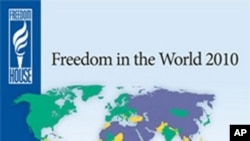The U.S.-based human rights monitoring group, Freedom House says that while Asia saw the most significant improvements in freedom last year, it still struggles with the basic issues of rule of law and freedom of expression. The group says situations in China, Tibet, North Korea and Burma are worrisome.
In its latest annual survey, Freedom House says that Asia received a mixed rating in 2009, a year marked by political progress and repression. Even so, the continent's modest improvements were the most significant worldwide.
Freedom House Asia researcher Sarah Cook says this was largely the result of gains in political rights in several countries in Asia.
Cook notes that the small south Asian island-nation of the Maldives held its first democratic parliamentary elections last year, furthering its dramatic political transformation during the past few years.
Other bright spots were peaceful elections in Mongolia and voting in Bangladesh, which allowed an elected civilian government to replace a military-backed administration.
But not all elections were bright spots. Freedom House says the massacre of journalists and civilians in the Philippines as they made their way to register a political candidate was a sign of possibly more electoral violence to come ahead of elections this year.
Sarah Cook says that Afghanistan's political rights rating saw a decline as a deeply flawed presidential election worsened the country's already unstable security situation and exposed government corruption.
"Elections in Asia often go quite well, and there has really been a consolidation," Cook said. "There's less violence and more fairness and more ability for candidates to participate, but it's more in the consolidation of institutions like the rule of law and freedom of expression where things are more difficult."
As some countries in Asia saw progress, others, such as China, Burma and North Korea, continue to repress the basic rights of their citizens.
Freedom House says more than 2.3 billion people in the world live in societies where fundamental political rights and civil liberties are not respected.
China, one of the world's biggest and most populous countries, accounts for about half of that number.
Cook says that developments in China last year were marked by overt displays of insecurity as the government clamped down around politically sensitive holidays - such as the 50th anniversary of the uprising in Tibet - and meted out harsh prison sentences to activists, lawyers and others.
Cook says that although the case of Liu Xiaobo, a Chinese dissident who was sentenced to 11 years in prison after calling for sweeping political reforms, has received much international attention, his case is one of many others.
"Other things we saw this year [i.e., 2009] kind of put his case in perspective," Cook said. "In September, you had a court sentence another democracy activist to 13 years for trying to organize a political party. There is another activist who was sentenced to 10 years."
Cook says that others in China, such as Falun Gong practitioners who had previously been sentenced to labor camp for two-to-three years, also received long sentences.
"So it's generally this kind of escalation of already long prison terms for people engaging in political or religious dissent," Cook said.
Freedom House's director of research, Arch Puddington, says that although it is unlikely that change will come soon to China or Tibet, governments in North Korea and Burma appear less stable.
"There could be changes coming to North Korea and there could be changes coming to Burma," Puddington said. "You've got regimes there that fear there own people. They are not stable regimes. They are in many respects fragile."
Puddington says that in North Korea, it is likely that after many waves of famine, unrest is likely to grow among the public or the country's military elite.
In Burma, Puddington says efforts by the international community to restore democracy or even improve things mildly have largely failed - leaving the country stagnating as one of the least free in the world.
The U.S.-based human rights monitoring group, Freedom House says Asia still struggles with the basic issues of rule of law and freedom of expression.










